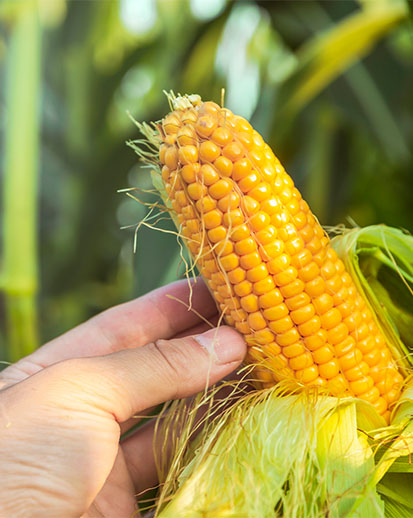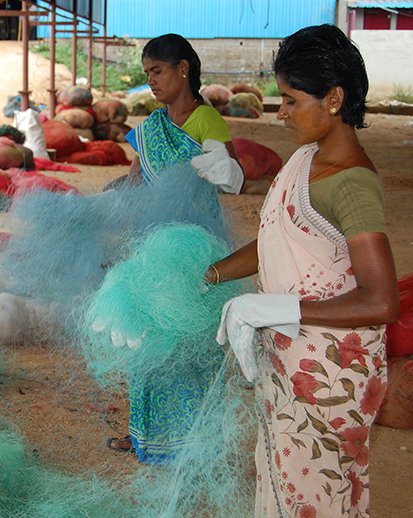Materiality
In order to assess material topics that are both of interest to society and have impact on our businesses, we annually update our materiality analysis. In 2021, we conducted a full materiality analysis due to the divestment of Resins & Functional Materials and associated businesses, and the accelerated strategic journey as announced in September 2021.
Our update in 2021 used the Materiality Matrix 2020 as its point of departure. A list of potential material topics was defined using desk research into third-party publications, peer analysis, interviews with DSM business managers, and internal documentation including the Corporate Risk Assessment 2020 and food systems reports. Feedback was received on the proposed topics through an internal employee workshop with representatives from our Business Groups and functions, and in an external stakeholder dialogue session with representatives from our customers, suppliers, peers, and investors. The resulting matrix was compared with the Corporate Risk Assessment to make sure all relevant topics were captured from a materiality and/or risk perspective. The matrix was reviewed and validated by the Executive Committee and finally, approved by the Managing Board.
Changes in 2021
The 2021 matrix is based on the ‘double materiality’ concept — addressing both the impact of the company on the topic and the impact of the topic on the company.
The matrix has changed to reflect our Health, Nutrition & Bioscience strategy, with an increased focus on nutrition- and food-systems-related topics. This has resulted in the renaming of a number of topics. Two topics (Geopolitical shifts & trade dynamics’ and ‘Advocacy, engagement & partnering’) have been moved into other material topics. One new topic has been added – ‘Responsible Sourcing’. The focus domains have been replaced with the underlying topics:
- ‘Climate & Energy’ was replaced by ‘Carbon Footprint Reduction’ and ‘Climate Adaptation’
- ‘Nutrition & Health’ was replaced by ‘Food Security’, ‘Sustainable Agriculture’ and ‘Healthy Diets & Nutritious Food’
- ‘Resources & Circularity’ was replaced by ‘Waste & Circularity’ and aspects of the existing topic of ‘Nature & Biodiversity’
For more information on materiality, see Management approach for material topics.
Materiality matrix 2021
Environment
Society
Business and Governance
Business impact
- Moderate
- Significant
- Major
Societal interest
- Moderate
- High
Responsible Sourcing
This topic refers to the company’s technology capabilities and research & development investments to develop innovative, sustainable solutions.
Climate Mitigation
This topic addresses reducing energy use and greenhouse gas emissions in our own operations, increasing the share of energy coming from renewable sources and developing solutions to support our customers in reducing carbon footprint across their value chains to enable the transition to a low carbon economy.
Food Security
This topic is part of the transition to sustainable food systems within planetary boundaries that is needed to secure the future availability of food.
Climate Adaptation
This topic addresses preparing for the physical and transition risks and opportunities associated with changing climate by ensuring operational procedures are flexible and resilient.
Business Ethics & Transparency
This topic addresses the company’s approach to and public disclosure on ethical and fair business conduct, corporate governance and compliance.
Talent Attraction & Development
This topic refers to the continuous development of employees’ skills through training and development programs, and the company’s ability to attract and retain talent in order to execute the business strategy.
Human Rights
This topic encompasses decent working conditions for DSM employees, suppliers and other partners across the value chain.
Healthy Diets & Nutritious Food
This topic is part of the transition to sustainable food systems within planetary boundaries that is needed to secure the future availability of food.
Waste & Circularity
This topic covers reducing waste in our operations and across value chain partners by enabling closed loop solutions with a focus on renewable and bio-based materials.
Occupational Health, Safety & Well-Being
Occupational health, safety & well-being addresses the company’s ability to create and maintain a safe and healthy workplace environment that is free of injuries, fatalities, and illness (both chronic and acute), and to take care of our employees’ well-being at work.
Consumer Behavior & Activism
Addressing changes in consumer behavior and awareness by manufacturing products that consider future needs of society and the environment.
Product Stewardship
Product stewardship manages and minimizes the environmental, safety and health impacts of substances in our products in line with international regulations from raw materials selection, production process, during use, until end-of-life.
Digital Transformation
Digital transformation refers to the application of digital technologies to all aspects of business and society.
Employee Inclusion& Diversity
This topic revolves around equal opportunities, in particular ensuring that our company culture and hiring and promotion practices embrace the building of an inclusive and diverse workforce that reflects the makeup of local talent pools and its customer base.
Water Stewardship
Water is essential to life and all ecosystems. As water is becoming a scarcer resource, both the quality and quantity of available water constitute a global issue that has local consequences that may extend from water scarcity to floods and storms.
Nature & Biodiversity
Nature & biodiversity refers to the protection of natural capital and ecosystems, including the variety and variability of life on earth and addressing issues such as land degradation, nature loss and ocean pollution.
Sustainable Agriculture
This topic is part of the transition to sustainable food systems within planetary boundaries that is needed to secure the future availability of food.
Sustainable Innovation
This topic refers to the company’s technology capabilities and research & development investments to develop innovative, sustainable solutions.
Cybersecurity
Preventing fraud and the unauthorized access to our networks, IT systems and data, while ensuring company and employee data protection.





